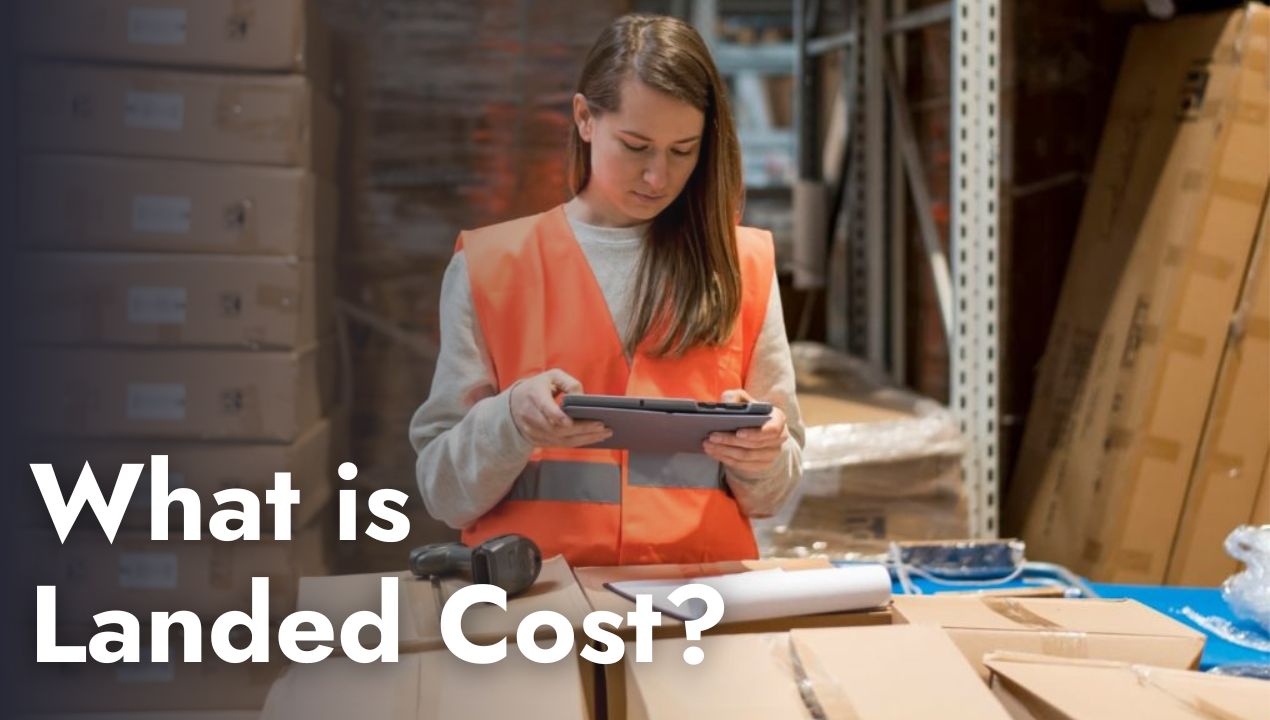Share this
Fulfillment Center vs. Warehouse: What's the Difference?
by Rin Mosher on Apr. 3, 2024

From 'third-party logistics company' to 'order processing facility' to 'distribution center,' discussions about ecommerce fulfillment involve many similarly-sounding terms. If you’re not in the know, one of the most confusing comparisons might be the differences between a fulfillment center vs. warehouse - two solutions that, despite sharing some overlap, are not the same when it comes to fulfilling ecommerce orders.
Understanding the differences between a full-fledged fulfillment center and a warehouse is essential when planning an effective supply chain strategy. In this blog, we'll break down the key distinctions between fulfillment centers vs warehouses and help you determine which one is right for your business.
What Is a Warehouse For?
A warehouse is a large commercial building primarily used for the storage of goods and materials. It is a crucial part of the supply chain process, providing a place for manufacturers, wholesalers, and retailers to store their products before they are sold to consumers.
Warehouses can vary in size and design depending on their purpose. Some may be small and used for storing perishable goods, while others may be large and used for storing bulk quantities of products. They can be automated with advanced technology or operated manually with traditional paper-based inventory management methods.
Individual consumers or businesses utilizing the products stored in warehouses do not directly deal with the warehouse for their purchasing needs. Instead, they buy products through retail outlets, ecommerce platforms, or other sales channels that have sourced their inventory from these warehouses. The warehouses serve as intermediate storage points where goods are kept before being distributed to places where they can be directly sold to these end customers, such as retail stores or through online fulfillment centers that manage direct shipments to consumers' addresses.
What Is a Fulfillment Center For?
Fulfillment centers play an all-encompassing role in ecommerce order fulfillment by handling most of the fulfillment process on their client’s behalf. This can include everything from inventory storage and management to picking, packing, and preparing boxes for shipment to end customers. All of the work is done in a warehouse-like facility by staff who are trained to handle high volumes of orders on a constant basis.
Fulfillment centers are operated by third-party logistics (3PL) providers that use and manage their own resources, such as inventory management and ecommerce integration software. Experienced 3PLs will also usually have business relationships with shipping carriers that allow them to negotiate better shipping rates than are available to the public, due to the volume they are consistently shipping from their fulfillment centers. Partnering with a fulfillment center comes with the benefit of being able to tap into their robust infrastructure without as much overhead.
Some fulfillment centers exclusively manage and fulfill direct-to-consumer orders, while others have a department dedicated to B2B or wholesale retail. Large companies like Sephora also invest in their own fulfillment centers to handle everything in-house. This comes with the benefits of business-tailored solutions but ultimately requires a significant amount of upfront capital.
Fulfillment Center vs. Warehouse: What's the Difference?
Let's start by acknowledging the main similarity: both fulfillment centers and warehouses are large buildings that hold inventory. This inventory comes in pallets and is typically stored on large racks throughout the facility.
The differences between a warehouse vs fulfillment center become clearer when a customer order is placed. While a warehouse is responsible for storing inventory and managing the movement of goods, a fulfillment center plays a critical role in getting orders ready.
This starts with picking, where items for an order are retrieved from their storage locations within a warehouse or fulfillment center.
The second phase, packing, involves carefully packaging goods to ensure they're ready for the final stage of shipping. Maintaining efficiency throughout every part of this journey is key to timely fulfillment, and ultimately customer satisfaction. Many fulfillment centers are equipped with warehouse management systems that guide staff as they retrieve, prepare, and package orders.
Warehouses, on the other hand, exist for the main purpose of storing goods. Incoming pallets of inventory are offloaded from delivery trucks, counted, inventoried, and stored. This serves the long-term purpose of storing and keeping goods safe but does not handle the process of preparing an order to be delivered to the end customer.
Fulfillment centers are optimized for the fast handling and shipping of goods rather than long-term storage. This means they often have a layout and design that prioritize efficiency in picking, packing, and shipping items over maximizing storage capacity. Because of this, they might allocate less square footage to purely storing goods compared to traditional warehouses. Inventory drop-offs by freight trucks and order pick-ups by delivery couriers are also more frequent to accommodate quick inventory turnover. Fulfillment centers, depending on the size of their space and the number of clients they serve, can ship thousands of orders a day through different avenues, while shipments from warehouses are typically larger and less frequent.
When to Use a Warehouse for Fulfillment
There are plenty of instances where using a warehouse for fulfillment is a smart move. For example, you should use a warehouse for fulfillment when you:
Plan to Maintain a Large Inventory of Products
The amount of space an ecommerce brand needs to house its products will vary based on factors such as sales volume, product size, and future demand. Businesses that require large stockpiles of inventory can benefit from having a designated warehouse in which it can be kept safe for as long as needed.
Fulfillment centers can accommodate a lot of inventory as well, but they aren't set up in a way that makes sense for large-scale and long-term storage. Businesses typically pay by the SKU or shelf, which can quickly become expensive if you have a high number of products.
Require Long-Term Storage
Fulfillment centers are optimized for the swift movement of goods rather than long-term storage. Holding onto inventory that does not frequently turn over can lead to inefficient use of valuable space, which is at a premium in these environments. These centers thrive on high-volume, fast-moving inventory operations, where the goal is to keep products moving rather than sitting idle.
Warehouses, on the other hand, are designed specifically for storage and can handle large amounts of inventory cost-effectively. While a 3PL’s storage fees blend the costs of space and convenient access for fulfillment, the monthly price for a warehouse facility is based on square footage and a rental rate. You can opt to lease an entire warehouse or pay for shelf space in a shared warehouse. The latter option is more economical as it ensures you aren’t paying for anything more than you need. Owned and rented warehouses offer more space and control but come with substantial operating costs and the potential for wasted space.
Already Have Fulfillment Infrastructure In Place
Fulfillment centers are an all-in-one solution to ecommerce order fulfillment – including inventory storage, order preparation, and shipping. Warehouses simply offer the space needed to store inventory without additional fulfillment services. Businesses that already have their own existing in-house fulfillment team and infrastructure might prefer leasing warehouse space to store their excess inventory and continue to keep their fulfillment operations as-is.
In these cases, you’ll need to have some sort of existing order fulfillment infrastructure in place to actually get orders out the door. This includes systems for tracking inventory levels, generating ecommerce shipping labels, and managing returns. Without this, a warehouse offers space and nothing else.
When to Outsource to a Fulfillment Center
Fulfillment centers can provide value to ecommerce businesses of all sizes and likewise cater to a variety of needs. You’ll find that there are more circumstances than not where this solution makes the most sense. For example, you can benefit from outsourcing to a fulfillment center when you:
Need More Reliable Order Processing and Packaging
As a business grows, so does its order volume. This increase in demand can lead to delays and mistakes if not managed properly. Fulfillment centers allow ecommerce businesses to offload the responsibilities of storing, managing, picking, packing, and shipping products to well-equipped teams with the resources necessary to get things done efficiently and accurately. Their training, paired with automated order processing systems, guarantees consistent performance and pays long-term dividends in terms of customer satisfaction.
Lack Cost-Effective Space
Fulfillment centers offer a very cost-effective pricing model to businesses that need warehouse space but don’t want to commit to leasing an entire facility. Businesses only pay for the space they use – nothing more and nothing less. With a leased warehouse, they'd have to rent out any additional shelving or risk wasting money. That’s in addition to floating the expenses associated with maintaining a large facility like utilities, maintenance, security, and more. Shared warehouses can also become expensive with the combination of base fees and square footage costs.
Want the Option to Scale
Many businesses start with limited warehouse space – whatever they can afford to meet baseline needs. This both constrains growth and limits operational agility. Ecommerce businesses that store a wide range of products need to make significant financial commitments if they want to scale, and it takes a lot of pre-investment to establish a system capable of handling unexpected changes in demand. 3PLs give their clients the luxury of being able to scale up or down based on their current business needs – whether a business is facing seasonal fluctuations or growing its order volume each month. Less upfront investment is required, and sellers can grow with the confidence of knowing their fulfillment solution will be able to keep up.
Require Fulfillment Expertise
Fulfillment is a highly complex process that involves everything from inventory management to shipping and handling. Most small and medium-sized businesses don't have the resources in place to handle it all on their own, while those that do must take on added responsibilities like hiring and training staff, and investing in technology and equipment. Outsourcing to a fulfillment center eliminates the need for all of these things as they already have the expertise, infrastructure, and resources in place. Dedicated staff exist to provide tailored advice on and assistance with day-to-day order fulfillment and take the burden off your shoulders by doing so.
There's no need to front the overhead costs of infrastructure or worry about how changes in demand might impact monthly operating expenses with a fulfillment center. Their teams are fully trained, and their workflows are consistently updated to reflect industry best practices. Working with a 3PL guarantees you're always on the cutting edge of fulfillment operations.
Making a Decision On a Fulfillment Center vs. Warehouse
The decision between using a fulfillment company or a warehouse can be overwhelming for ecommerce companies. With so many factors to consider, having the right guidance and support by your side is crucial. That's why it's best to work with a professional 3PL company that can assist you in both understanding these nuanced terms and implementing solutions made to suit your business needs.
Shipfusion has provided industry-leading 3PL warehousing fulfillment services to ecommerce businesses for over a decade, with each year being more efficient than the last. When you work with us, you can rest assured that your inventory will be stored, managed, and shipped with the utmost care and attention to detail. Our on-site Account Managers add an extra layer of peace of mind against the unknown. Contact a member of the team to get started today.
Share this
You May Also Like
These Related Articles

What is Dunnage and How Can It Improve Shipping Efficiency and Reduce Costs?

What Is Landed Cost, and How Does It Affect Profitability?

Order Fulfillment and Customer Service: What’s the Connection?
- April 2024 (7)
- March 2024 (5)
- February 2024 (5)
- January 2024 (5)
- December 2023 (4)
- November 2023 (2)
- October 2023 (5)
- September 2023 (4)
- August 2023 (2)
- July 2023 (1)
- June 2023 (4)
- May 2023 (1)
- March 2023 (2)
- February 2023 (1)
- October 2022 (1)
- September 2022 (5)
- August 2022 (4)
- July 2022 (7)
- June 2022 (4)
- May 2022 (5)
- April 2022 (7)
- March 2022 (2)
- February 2022 (1)
- January 2022 (3)
- December 2021 (2)
- November 2021 (4)
- October 2021 (2)
- September 2021 (5)
- August 2021 (4)
- July 2021 (5)
- June 2021 (4)
- May 2021 (2)
- April 2021 (3)
- March 2021 (3)
- February 2021 (3)
- January 2021 (2)
- December 2020 (4)
- November 2020 (2)
- October 2020 (4)
- September 2020 (2)
- August 2020 (1)
- July 2020 (6)
- June 2020 (5)
- May 2020 (2)
- April 2020 (2)
- March 2020 (4)
- February 2020 (1)
- December 2019 (1)
- May 2018 (1)
- March 2018 (2)
- February 2018 (3)
- January 2018 (3)
- November 2017 (3)
- July 2017 (4)
- March 2017 (3)
- February 2017 (5)
- January 2017 (3)
- December 2016 (4)
- November 2016 (6)
- October 2016 (6)
- October 2015 (1)
- September 2015 (1)
- June 2015 (3)
- May 2015 (3)
- August 2014 (1)
- July 2014 (1)
- March 2014 (1)
- February 2014 (1)